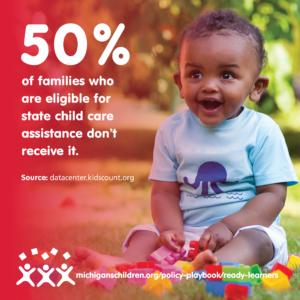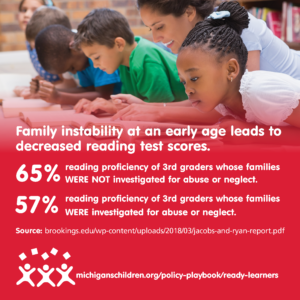Before the pandemic, despite a booming economy, child care barriers kept thousands of parents unemployed or underemployed. As we emerge from a generational crisis, child care access will help ensure that these families are brought along in our state’s recovery and that children are spending time learning and connecting with others. Many families struggle with the child care cost burden, and many more families – including those working at odd hours, parents with infants and toddlers, student parents, and adults involved with the foster care system – experience additional unique barriers to accessing child care that deserve attention.
Families who raised young children or welcomed new ones during the pandemic are also concerned with maintaining healthy growth and development for their children. Research shows that access to high quality care and services early in life improves key educational, economic, and social outcomes later on by developing skills and promoting young children’s healthy growth. Without them, kids enter kindergarten behind their peers, and stay behind. Third grade reading test scores in Michigan remain troubling, but the opportunity to rebuild after a disruption offers means that we can reprioritize how we support cornerstones of a child’s early growth: their families, their health, and their social and cognitive development.
Access to high-quality child care has been proven to close gaps in early learning by helping young children develop the social and cognitive skills they need to interact with others along with basic literacy and numeracy. High quality child care is also essential for parents to engage in work, job training, or education to support themselves and their children, but many families in need cannot access state support.
- Invest federal and state funds into child care family support eligibility and provider payments, which will ensure young children are closing the early learning gap, protected against poverty-related risk factors, and enabling their parents to access a job or job preparation.
- Tackle unique barriers that prevent families who are already eligible for child care support from accessing it, including pursuing contract arrangements with rate enhancements for slots for specific underserved family populations by age, need, and qualification.

- Create an enhanced child care support system for families in the foster care system who struggle to find and keep child care even though they automatically qualify for support.
- Grow and strengthen the state’s child care workforce, including the family, friends, and neighbors who are trusted by many families to provide quality childcare, including by supporting family child care networks and shared services.
Ensuring children are born healthy and are developmentally on track results in a healthy start for young children. This includes access to developmental screenings and services for every family whose infant or toddler has or is at risk of delay and access to support for parents and other caregivers to ensure opportunities to build early skills needed to thrive.
- Preserve and expand recent state investment in Early On Michigan to provide recognized levels of service to all eligible infants and toddlers. Early On provides screening and services to families with infants and toddlers with and at risk of acquiring a developmental delay, equipping families in their homes with skills to help their children, often preventing the need for future costly K-12 special education services.
- Create a single unified system that serves infants and toddlers eligible for both Early On early intervention services and
 Michigan Mandatory Special Education. The current “two-tiered” system results in uneven services, creating equity gaps.
Michigan Mandatory Special Education. The current “two-tiered” system results in uneven services, creating equity gaps.- Increase state support for mental health consultants to provide support and services to providers and families in child care settings across the state in both formal and in-home settings.
- Take steps to strengthen the state’s entire early childhood workforce, including professionals who conduct early interventions, mental and behavioral health services, and home visits and parent education.
Supporting parents to be their children’s first and best teachers results in safe, stable, and nurturing home environments that promote children’s early learning and development. Also critical is to enable communities to drive resource investments based on their own needs and the needs of their families.
- Increase state support to provide statewide access to voluntary evidence-based home visiting programs based on local needs assessments. These quality programs work with families exhibiting some risk to promote early learning and healthy child development and improve birth and early learning outcomes.
Take a Deeper Dive and explore these Issues Briefs by Michigan’s Children:
Learn how public policy decisions impact Michigan families and their children in these Spotlight stories by Michigan’s Children.



 Michigan Mandatory Special Education. The current “two-tiered” system results in uneven services, creating equity gaps.
Michigan Mandatory Special Education. The current “two-tiered” system results in uneven services, creating equity gaps.